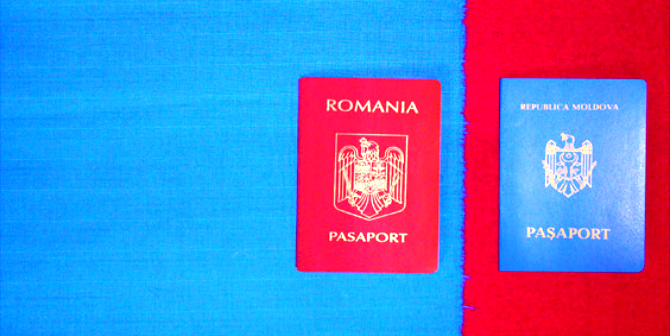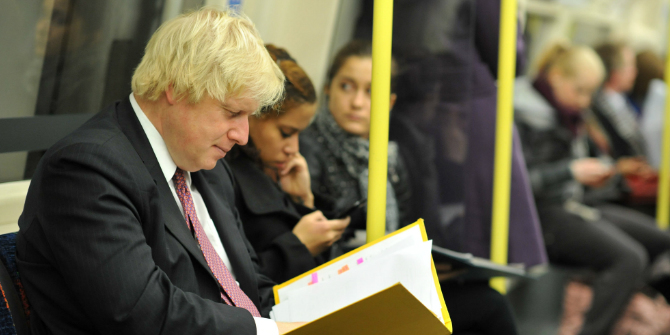 Rejoice! Brexit doesn’t just mean getting our country back from the stranglehold of the EU. Brexit will also mean the return of the tangible symbol of what it means to be British: the blue passport. Eleanor Knott (LSE) writes that blue passports are meaningful outside the EU, too. In Moldova, the blue passport symbolises a world in which Moldovan citizens were unable to travel freely around Europe. In the UK, the blue passport is the symbol of all that the country is giving up in the name of Brexit.
Rejoice! Brexit doesn’t just mean getting our country back from the stranglehold of the EU. Brexit will also mean the return of the tangible symbol of what it means to be British: the blue passport. Eleanor Knott (LSE) writes that blue passports are meaningful outside the EU, too. In Moldova, the blue passport symbolises a world in which Moldovan citizens were unable to travel freely around Europe. In the UK, the blue passport is the symbol of all that the country is giving up in the name of Brexit.
The blue passport, after all, is a symbol to which we can all relate – a symbol which can be rightfully returned to us now we have left the neo-imperialist European super-state. We have our rights back.
Of course, none of this is true. The EU never imposed the colour of passports on member-states. The EU does not even impose common rules of citizenship across member-states.
But I wouldn’t be so quick to assume that blue passports are meaningless. Look beyond the UK and you don’t have to look far for a precisely red vs. blue passport domestic and cross-border debate: Moldova. It is not for nothing that I tweet #MoldovanBrexit every second day.

#MoldovanBrexit
In Moldova, the blue passport demonstrates the world in which Moldovan citizens are situated. A world where their rights to access spaces abroad are limited (especially before 2014). It is the crippling costs of applying for visas, the crippling bureaucracy of applying for visas, the crippling time it takes to apply for visas, or the not-unlikely possibility that you might have to travel to a third-country intermediary (and acquire a visa for the third-country) to apply for the visa for the state you want to visit.
The red passport meant an end to all this. Before 2014, the red passport meant acquiring (or reacquiring) Romanian citizenship (and EU citizenship). The red passport meant acquiring the rights, status and belonging that Moldovan citizenship could not provide.
Since 2014, the red passport has also come to mean the fresh-faced Moldovan e-passport. Moldovans can now travel visa-free to the Schengen area so long as they have a red e-passport. The colour of the passport, of course, was not imposed on Moldova. The Moldovan state chose a red passport to show harmony with the EU (and the overcoming of the barriers of the blue passport). The EU did, however, insist on the e-passport for those wanting to travel visa-free to Schengen countries.
You have to wonder, then, why the UK would willingly give this all up. The UK government want us to believe that the blue passport is the symbol of all we lost by joining the EU. The blue passport transports us back to a time where British people could decide their own laws.
But the blue passport is the symbol of all that we are giving up.
Britain’s postcolonial reckoning
I’m not all gloomy about Brexit. Brexit might be precisely the post-colonial reckoning that Britain needs: a shake of realisation that Britain cannot force the EU, China, India and the US, among others, to yield to it. We will be the country forced to yield, not the other way around.
When the UK sees India, it sees a land of hope and opportunity: markets, people and skills. When India sees the UK, it sees a now provincial and former colonial overlord. Britain may remain blind to this reality gap. It might remain blind to the everyday post-colonialities of the twenty-first century. But Britain will experience this reality gap whether it can see it or not.
More likely, of course, Brexit will perpetuate Britain’s victim-framing narrative. It will no longer be the EU victimising the UK from within, imposing non-sensical directives. It will be the EU victimising the UK through Brexit; punishing the UK for wanting a clean divorce, crippling the City to serve its own ends and preventing us from trade deals with those queuing at our door. We already see this narrative taking shape.
Brexit will mean a curtailment of Britain’s rights and status in the international world, within and beyond the EU. The periphery is waiting for us. Let’s go and meet Moldova, with our blue passports.
This post represents the views of the author and not those of the Brexit blog, nor the LSE.
Eleanor Knott is Assistant Professor in the Department of Methodology at LSE. As well as eastern European identity politics, she currently researches the experiences of non-UK EU citizens following the Brexit referendum. She tweets @ellie_knott







-Australia has a blue passport. many, many want to come and live here. we control our borders, we are not governed by foreign entities. having an Australian passport is a privilege- not a entitlement. 25 years recession free here- thats the world record. “Brexit will mean a curtailment of Britain’s rights and status in the international world, within and beyond the EU. The periphery is waiting for us. Let’s go and meet Moldova, with our blue passports.”
– better still go and join with Australia (BLUE PASSPORTS) our commonwealth cousins- trade will be huge , speak the same language, on opposite sides of the world, with different and varying economys that can complement each other. Blue passport in australia, a free country with no overlords. serf to no one.as a remainer i perceive you are, maybe you should go and live in europe. I cannot fathom why those who espouse the EU and its ‘benefits’ and wish only bad and negative on the UK havent already packed up and emigrated to a country in the EU. Pack up, sell up, ship out..choose 1 of 27 and leave. ‘simples’
learn the local language to native level (4 years) finding any job you can do in the mean time (burger flipping, skivvying) then work your way up. rent is cheaper, pay is much much lower, jobs scarcer. If you entitle yourself to a platform through your ‘placement’ in a media at least have a unbiased view based on the real world. I have lived 22 years in europe, and now i live in Australia.having a blue passport does not make the UK a second rate country. many, many are fighting to become Australian citizens for all that it brings to them.Blue passports and all.